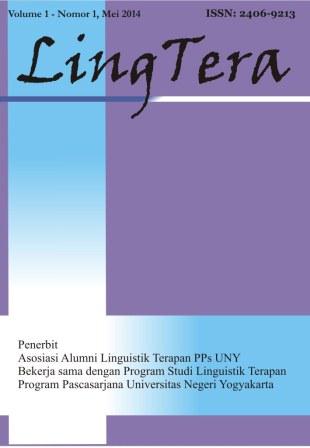Language attitude of undergraduate students towards English at English Education Department
DOI:
https://doi.org/10.21831/lt.v5i1.8583Keywords:
language attitudes, undergraduate studentsAbstract
This research aims to: (1) describe the language attitudes of undergraduate students of English Education Department of Surakarta Muhamamadiyah University toward English language in terms of their behavioural, cognitive, and affective aspects; and (2) investigate the differences in language attitudes of undergraduate students towards English across gender and length of study at English education department of Surakarta Muhammadiyah University. This research employed a mixed method research design to collect, analyse and to mix both quantitative and qualitative data in a single study. Researcher used theory in a quantitative study to provide an explanation about the relationship among variables in the study. Thus, it is essential to have grounding in the qualitative study. The results of the study are as follows. The undergraduate students have different language attitudes, in terms of cognitive, behavioural, and affective aspects of language attitudes towards English. There is a statistic difference in the undergraduate students' language attitudes towards English across gender. The attitudes of male undergraduate students towards English are higher than that of female ones indicating more positive attitudes towards English. It means that there is a rejection of the null hypothesis, because there is a significant difference between male and female undergraduate students' attitudes towards English. There is a difference among the three groups in terms of length of English study. The freshman group showed slightly higher language attitudes compared with those of the other two groups.
References
Aldosari, H.S. (2014). The entwined effects of attitude, motivation and gender on EFL learning: A correlation study. Journal of Studies in Literature and Language, 8 (1), 1-5.
Arifin, W.L. (2012). The eddects of the text-based vocabulary teaching model on the communicative vocabulary competence of the TBI fourth semester Students of STAIN Salatiga. Thesis the degree of M.A. Applied Linguistics (English Language), unpublished thesis, Yogyakarta State University, Yogyakarta.
Barnes, B. D., & Lock, G. (2010). The attributes of effective lecturers of English as a foreign language as perceived by students in a Korean university. Australia Journal of Teacher Education, 35(1).
Bryman, A. (2008). Social research methods (rev. ed.). New York: Oxford University Press.
Creswell, J.W. (2013). Research design: qualitative, quantitative, and mixed methods approaches. London: SAGE Publications, Inc.
Jenkins, J. (2014). English as a lingua franca in the international university: The politics of academic English language policy. Oxford: Routledge.
Kachru, Y. & Smith, L.E. (2008). Cultures, contexts, and world Englishes. New York: Routledge Taylor and Francis Group.
Lauder, A. (2008). The status and function of English in Indonesia: A review of key factors. Makara, Social Humaniora, 12(1), 9-20.
McCoach, D.B., Gable, R.K., & Madura, J.P. (2013). Insrument development in the affective domain. New York: Springer.
Melhim, A. & Rahman, A. (2009). Attitudes of Jordanian college students towards learning English as a foreign language. College Student Journal. Online. Accessed on December 15, 2015 from http://web.ebscohost.com.
Republik Indonesia. (2003). Undang- undang RI nomor 20, tahun 2003, tentang sistem pendidikan Indonesia.
Sholihah, R.A., and Suharti. (2015). Sikap dan pemertahanan bahasa Indonesia siswa kelas X SMA Internasional Budi Mulia Dua Yogyakarta. Lingtera. Accessed on January 29,2016,from http://journal.uny.ac.id/index. php/ljtp.
Soleimani, H., & Hanafi, S. (2013). Iranian medical students' attitudes towards English language learning. International Research Journal of Applied and Basic Sciences. Sciences Explorer Publications.
Sugiono. (2013). Metode penelitian kombinasi (mixed methods). Bandung: Alfabeta.
Yusny, Rahmat. (2014). ELT in Indonesian Context: Issues and Challenges. Englisia, 1(1), 81-99.
Ukpong, D.E., and George, I.N. (2013). Length of study-time behaviour and academic achievement of social studies education students in the university of Uyo. International Education Studies, 6 (3), 172-178.
United Nations Educational, Scientific, and Cultural Organization. (2003). Education in multilingual world (UNESCO Education Position Paper). France: UNESCODownloads
Published
How to Cite
Issue
Section
Citation Check
License
LingTera allows readers to read, download, copy, distribute, print, search, or link to its articles' full texts and allows readers to use them for any other lawful purpose. The journal allows the author(s) to hold the copyright without restrictions. Finally, the journal allows the author(s) to retain publishing rights without restrictions.
- Authors are allowed to archive their submitted articles in an open-access repository.
- Authors are allowed to archive the final published article in an open-access repository with an acknowledgment of its initial publication in this journal.

Psychology, Evaluation, and Technology in Educational Research is licensed under a Creative Commons Attribution-ShareAlike 4.0 International License.
Based on a work at https://petier.org/index.php/PETIER.










